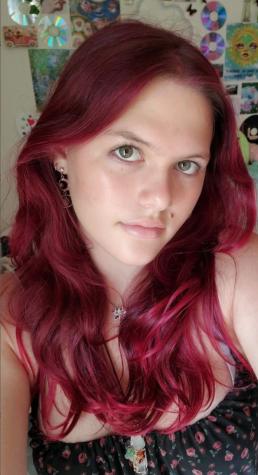Baraye is an universal anthem of hope
A screenshot taken from a recording of Shervin Hajipour singing Baraye on his Instagram. The tweets that inspired the lyrics to the song showed on screen as he sang. The video was removed from Hajipour’s Instagram by the Iranian government shortly after his arrest on Sept. 28, 2022.
March 6, 2023
On Tuesday, Sept. 13, 22-year-old Mahsa Amini was arrested and killed by morality police in her home city of Tehran, Iran, for violating the country’s strict dress code policy that requires women to cover their hair with a Hijab.
Since then, thousands of people have flooded the streets in Iran to demand accountability for Amini’s death and an end to violence and discrimination towards Iranian women.
Twenty-five-year-old Iranian singer Shervin Hajipour responded to the situation through his song Baraye, which he wrote using tweets from fellow Iranians explaining what motivated them to participate in the protests.
Hajipour recorded the song to a solemn melody of bass and piano before posting it on his Instagram on Monday, Sept. 26. He was arrested two days later by the Iranian government, according to CNN.
Two days ago, I didn’t know any of this. I had seen a handful of TikToks in which women documented themselves getting dressed with the caption: “Get ready with me to get killed in Iran,” but I had zero understanding of the context.
I’m sure that I wasn’t the only one among the millions of people who viewed these videos that were unaware of the situation in Iran. Even with access to limitless information via social media and the internet, many of us are confined to a bubble of knowledge that doesn’t extend beyond our own interests and experiences.
This makes perfect sense if you think about just how much information we are exposed to on a daily basis. It’s overwhelming, so we filter it down to what we can and want to process.
But there are some pieces of media that are universally important that reach people everywhere.
Baraye — meaning because of in Persian —is a heartfelt anthem that embodies the solidarity of the Iranian people in their fight to bring justice to Amini and liberate the women of their country.
For dancing in the alleys
For terror when kissing
For my sister, your sister, our sisters
For changing rusted minds
For the shame of poverty
This verse depicts the endless reasons Iranians are taking a stand and risking their lives. They were driven to the streets after decades of fear and years of forced suppression.
I was immediately touched by these lyrics when I first listened to Baraye. I’m often too invested in the happenings within my bubble that I forget to step outside. Baraye was a reminder of how much I take for granted.
The freedom to simply dress how I choose is not something I’ve ever had to think about. It’s easy to forget that there are thousands of women in the world who fight and risk their lives for a chance at this freedom.
It’s even harder to envision life through these women’s eyes. While social media has opened me up to so many diverse perspectives, its made it more and more difficult to grasp that these people exist beyond my phone screen. I feel like I’ve lost the ability to humanize the anger, oppression, and tragedy that I see so often online.
The same is true when it comes to the situation in Iran. As I scrolled through TikTok and saw women who expressed fear for their lives when simply leaving their homes without a hijab, I hardly gave it a second thought. I kept scrolling mindlessly, numb to what I had seen.
This doesn’t mean I don’t care; I do. But just like everyone else, I’ve learned to disconnect from the content I see online.
Baraye was different.
The emotion in Hajipour’s voice is palpable. When listening to him sing, I could close my eyes and feel the despair in his voice despite not understanding the Persian lyrics.
His voice, with a solemn melody and touching lyrics, made it easy to internalize his message.
Suddenly, the women I had seen on Tik Tok were more than just faces on a screen. Their fear and anger were real and tangible.
For the feeling of peace
For the sunrise after long dark nights
For the stress and insomnia pills
For man, motherland, prosperity
For the girl who wished she was born a boy
For woman, life, freedom



